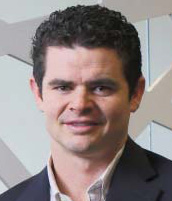Are You Keeping Up With Your Customers' Changing IT Needs?
By The Business Solutions Network
This solutions provider’s expertise and business acumen enable it to respond quickly to market trends and customer demands and expect year-over-year double-digit revenue growth.

Obtaining gold- and platinum-level certifications with its vendors not only gives VLCM up to 25 percent lower costs on products, it also plays a key role in being able to speak more confidently and sell more solutions, says Mike Linton, VLCM’s VP of sales.
Photo By Justin Howlett
One of the most striking ironies of information technology is that while it’s often developed with the goal of enabling users to work more efficiently, it also plays an undeniable role in stretching our work days into the “off hours” and weekends. IT solutions providers are not immune to this same pressure — feeling they need to be at customers’ beck and call 24/7/365, while at the same time having to keep up with the latest IT products, technical certifications, and industry regulations. And let’s not forget about the pressure to keep a pulse on emerging technologies such as converged architectures, the Internet of Things (IoT), and virtualized containers. While technical expertise is still an important differentiator among IT solutions providers, being able to detect trends and opportunities — and respond quickly — has become an equally important quality. And that’s exactly how IT solutions provider VLCM (pronounced “Valcom”) has built a thriving business that is 30-plus years old and still going strong.
Privately owned since the beginning, VLCM provides comprehensive IT solutions to customers in the public and private sector throughout the states of Utah, Colorado, Idaho, New Mexico, and Arizona. I recently spoke with VLCM’s VP of sales, Mike Linton, to learn about his company’s insights and strategies on keeping up with the ever-changing IT landscape, always preparing for what’s next.
Let Industry And Vendor Certifications Govern Your Business Decision Making
VLCM has found that following smart business processes and gaining expertise with its core vendors plays a key role in differentiating itself from its competitors. One example that illustrates this point is the MSP’s (managed services provider’s) ITIL (Information Technology Infrastructure Library) Foundation certification, which was achieved in 2014. The ITIL Foundation is an important part of the ITIL framework, which describes processes, procedures, tasks, and checklists designed to enable any organization to establish a baseline from which it can plan, implement, and measure its IT initiatives. Solutions providers may use ITIL practices, for instance, to reduce help desk traffic by implementing an FAQ (frequently asked questions) page on their websites. Or they may use ITIL guidelines to decide whether an IT service is performed in-house (e.g., level 1 help desk support) or if it should be outsourced. “The process costs approximately $1,500, plus a week away from the office, but we feel that it was well worth it,” says Dave Toronto, a managed services and technology consulting manager at VLCM.
VLCM also strives to achieve high levels of certifications with its vendor partners. It currently holds gold-level status with the following vendors: Aruba Networks, Microsoft, ShoreTel, Tenable, and Veeam Software. And it holds a platinum-level status with these vendors: HPE, HP Inc., Intel, and Sophos.
“One of the immediate benefits of obtaining higher status levels with vendors is that we receive better pricing on their products,” says Linton. “When you contrast what an authorized partner pays with what a platinum-level partner pays, it can be a 25 percent difference. Not only does this help our profitability, it enables us to price our solutions more competitively.”
As engineers gain expertise in specific product lines, they are more comfortable talking about the products with customers, which leads to more sales and shorter sales cycles, says Linton. “Plus, customers like the fact that they are working with a company that has a deep knowledge of the products and solutions it’s selling, and that makes them happier.”
Embrace The Inevitability Of All Things Cloud
One area in particular where VLCM is seeing its ITIL training and close vendor alignment paying off is with Microsoft and cloud services. This is a sticking point with some other solutions providers who are still unable to let go of the Windows Small Business Server (SBS) days (pre-2012) and $10,000 Exchange Server projects. Granted, replacing $10,000+ in immediate income with a few hundred dollars per month in recurring revenue can be scary at first and seemingly counterintuitive. But it’s much more fruitful in the long term to find new ways to add value to your customers rather than wasting time fighting against the inevitable.
VLCM’s foray into selling cloud services entailed obtaining several Microsoft certifications, including:
- Exam 70-341: Core Solutions of Microsoft Exchange Server 2013
- Exam 70-342: Advanced Solutions for Microsoft Exchange Server 2013
- Exam 70-533: Implementing Microsoft Azure Infrastructure Solutions
- Exam 70-534: Architecting Microsoft Azure Solutions
- All Microsoft certifications leading to MCSE (Microsoft Certified Systems Engineer)
Having these certifications allows the MSP to offer a lot more cloud services beyond simply offering hosted email solutions. “End users considering Office 365 often struggle with critical planning details, including the who, what, when, where, and how of getting from on-premise to the cloud,” says Linton. “It can actually be a highly complex process full of frustration and downtime if it’s not planned out properly. We have done approximately 60 Exchange migrations to date, and some of these projects can take three months from start to end.”
After consultation and assessments have been performed and the customer’s data and office applications have been migrated to the cloud, it doesn’t end there, says Linton. “Office 365 customers still need maintenance services and help desk support,” he says. “If they are unable to access their email or have a problem with an app, you don’t want to leave them on their own to have to figure out if it’s a Microsoft cloud issue, a problem with their Internet provider, or an internal issue. That’s one more valuable service an IT solutions provider can offer.”
Because the transition to Office 365 is so consultation-intensive, VLCM finds that shortly after an initial migration project, it leads right into discussions about additional Microsoft services such as SharePoint, Dynamics CRM, and EMS (Enterprise Mobility Suite).
In addition to the cloud services mentioned above, cloud consolidation is another growing trend the MSP is seeing. “Besides their Microsoft apps and services, most companies have two or three cloud services with other vendors, such as Box or Dropbox,” says Linton. “They need a way to bring all those services together into one true system of record, so they can control which applications and data can be accessed by specific employees.”
Linton says VLCM’s cloud services expertise has enabled it to move well beyond the $10,000 on-premise Exchange Server projects that were common five years ago. Despite having technical expertise in several product areas, however, he says it is equally important to have a deep knowledge of customers’ business needs, including what they do and how they communicate with their customers. “This is where methods such as ITIL are helpful at getting salespeople and engineers to be process-oriented and to learn how to ask the right questions to uncover customers’ business needs,” says Linton.

“[The move to Office 365] can actually be a highly complex process full of frustration and downtime if it’s not planned out properly.”
Mike Linton,
VP of sales, VLCM
Capitalize On The Mobile IT Trend
Another recent example that illustrates VLCM’s alignment with its vendors occurred last year, after HP acquired wireless networking company Aruba Networks. “We saw this acquisition as a confirmation that it was time for us to make a deeper commitment to providing mobile services,” says Linton. One of the first initiatives VLCM completed was having two salespeople and two technicians obtain certification on Aruba ClearPass Policy Manager. This mobile management platform is used to provide secure network access to mobile devices and IoT devices by using contextual data (from users and devices) and enforcing adaptive policies for wireless, wired, or VPN access.
“This platform is complementary to a mobile device management [MDM] solution,” says Linton. “It focuses on the network and enables solutions providers to regulate network access, define and enforce policies, and deliver a secure and reliable mobile experience. In addition to our four ClearPass-certified employees, 28 additional employees have attended one or more formal ClearPass training classes. Our commitment has been well-received by our customers, too, and in a short time we have obtained Aruba ClearPass Specialization certification, Aruba Certified Mobility Professional [ACMP] certification, and Aruba Certified ClearPass Associate [ACCA] certification, and we have become one of Aruba Network’s fastest-growing partners. I estimate we will have up to 10 times as many customers using Aruba ClearPass Policy Manager in 2016 than we did in 2015.”
Face-To-Face Marketing Still Works In The Digital Age
Linton says there was a time when VLCM did not participate in industry events or do a good job getting its messaging out to customers. But that too has changed in recent years and has become a key component to the company’s growth and success. “We now host about 100 trade shows and other face-to-face events that put us in front of CIOs and other key decision makers,” he says. “We prefer regionally focused shows, such as our IT Exchange Events, which include about 50 vendors and a couple hundred prospects. Events such as these allow us to get educated on the latest technology and trends, prospect for new business, and network with our vendors. We typically see a tenfold return on our investment at these events, so it’s well worth it for us to host them. We leverage marketing development funds [MDF] from our vendors and, because of our success, it makes it easier to have vendors continue investing with us.”
Continued growth can’t happen without the right people, says Linton, and hiring has been another top initiative at VLCM. “We have added 45 new employees over the past five years in roles such as account managers, sales, and engineers. One thing we place a high emphasis on during the hiring process is culture and fit. Even more important than finding someone with the right technical experience and certification, it’s important to find someone who is customer-focused and who works well with others. If you find the right person you can always train them to fulfill any technical requirements. In today’s fast-paced work environment, it may be tempting to skip over this advice, but this is one area where it will pay dividends — to your customers and other employees — to slow down, take a little extra time, and get it right.”

